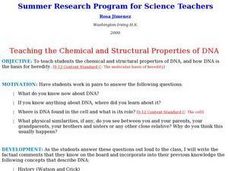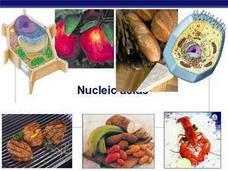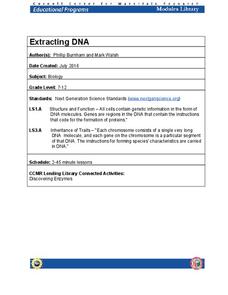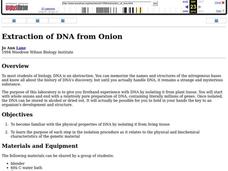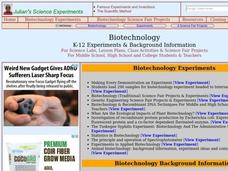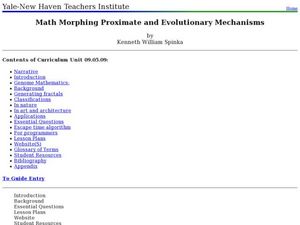Curated OER
Teaching the Chemical and Structural Properties of DNA
High schoolers work together to answer questions about DNA. They identify where DNA is found and its function in the cell. They note any physical similarities they have with their family members
Curated OER
Producing a Strain of E. coli that Glows in the Dark
Students observe the experimental process called bacterial transformation and demonstrate phenotype changes in bacteria that have been transformed with an antibiotic-resistance gene and a metabolic marker. They create a luminescent...
Curated OER
Nucleic Acids: information storage
This sequence of slides covers each main macromolecule that is involved with human structure and function. The history of nucleotide research and the way that they are formed is summarized, a diagram accompanies the explanation. The main...
Curated OER
Prokaryotes
They're everywhere! They're everywhere! Prokaryotes cover the Earth! Biology buffs survey the microscopic world of bacteria, including their general structure, metabolism, commercial uses, and diseases caused by pathogenic varieties....
Cornell University
Extracting DNA
Uncover the basics of DNA structure through exploration activities. Collaborative groups build DNA models and recreate the process of replication. Then, using plant cells such as peas or strawberries, they extract a DNA sample.
Curated OER
Regulating the Internal Environment
This presentation begins with the many problems multicellular organisms which rely on diffusion encounter. There are many diagrams of mammalian organ structures, and they are labelled with their relevant functions. This an excellent...
Biology Junction
Viruses, Viroids, and Prions
Are viruses living or non-living? According to the presentation, they are both and neither. Clearly, this requires clarification and an in-depth look at viruses, viroids, and prions. Young scientists learn about the history, structure,...
Serendip
DNA
Get up close and personal with DNA! A two-part hands-on activity has learners extract DNA from a small organism and then their own cheek cells. Scholars then explore DNA replication using questions to guide their analyses.
Curated OER
Atoms and Elements: An Introduction
Students are able to discuss the difference between a proton, a neutron and an electron. They also can explain the difference between an ionic and a covalent bond. Students know the main structure of atoms and molecules. Student are able...
Curated OER
Meiosis Worksheet
These two pages cover the gamut of topics regarding reproduction and DNA replication. Structures, processes, functions, and reasons for them are tested here. The questions are mostly multiple choice, but there are also a few...
Curated OER
Raven Chapter 10 Guided Notes: Photosynthesis
Kim B. Foglia has designed a comprehensive series of AP biology worksheets. This one focuses learners on the progression of photosynthesis in plants. In this assignment, they identify structures and steps on high-quality diagrams, use...
National Center for Case Study Teaching in Science
Identical Twins, Identical Fates?
Can different personal experiences affect our genes? Find out in an intriguing case study about one twin who is diagnosed with mental illness and her identical twin who fears she may suffer the same fate. Designed for college-level...
Curated OER
Protists and Fungi
Here is an outstanding presentation on protista. It lists general characteristics, and then moves on to describing three different categories of protists. For each, viewers learn physical features, behaviors, and means of reproduction....
Curated OER
Control of Prokaryotic (Bacterial) Genes
A nicely formatted set of slides that logically follow and define the structure and function of the genes in Bacteria. The repressor proteins and other gene regulators are listed and diagrams support the explanations of their function on...
Serendip
UV, Mutations, and DNA Repair
How effective are cells at repairing UV damage? An inquiry-based lesson has learners experiment with organism by exposing them to various levels of UV light and then examining their DNA after a period of time. Pupils test different...
Curated OER
Macromolecules
Titled "Macromolecules," this worksheet does not cover carbohydrates. However, it is a worthy quest to uncover the properties of lipids and proteins. Biology pupils write short answers to detailed questions about the structure and...
Biology Junction
Annelids: The Segmented Worms
Here's a lesson that just might make your class squirm! Learn about segmented worms in a detailed PowerPoint presentation including the wriggly earthworms young scientists dig up in their backyards. Although seemingly simple creatures,...
LABScI
Circulation and Respiration: Vital Signs
What do your vital signs tell your doctor? An engaging hands-on lesson has your learners monitor their own lung capacity, blood pressure, and heart rate. They then connect the vital measures to the workings of the circulatory and...
Curated OER
Extraction of DNA from Onion
Students experiment with DNA by isolating it from plant tissue. They investigate whole onions to prepare DNA. They complete the experiment to examine the structural characteristics of DNA.
Curated OER
What is an Angiosperm?
In this plant worksheet, students study a diagram of a magnified root cross-section. Students use this diagram to complete 2 true or false questions.
Curated OER
Homologous Shoes
Students examine the concept of homology by observing their shoes and those of their classmates. They summarize the observations of everyone's shoes relating it to chromosomes in cells. They share their observations with the class.
Biology Junction
Bacteria Crossword Puzzle
In this biology instructional activity, high schoolers complete a crossword puzzle with 42 questions about bacteria. They identify the different characteristics of bacteria.
Curated OER
Biotechnology
Students explore biotechnology through various activities. For this biology lesson, students analyze its pros and cons. They study and read informative articles about biotechnology.
Curated OER
Math Morphing Proximate and Evolutionary Mechanisms
Students identify the different types of fractals. In this geometry lesson, students use math to analyze different biological phenomena. They collect data from the experiments and construct graphs.


